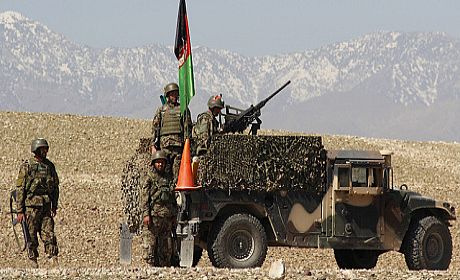Pakistan Concerned About Its Own Interests

One of the ministers of the Pakistani government has expressed concern over the exit of NATO forces and the US army and has mentioned as an excuse the fear of the return of the Taliban to power. Is the reason behind the dissatisfaction of the Pakistanis the fear of the Taliban who, nonetheless, are supported by part of the ruling body of this country?
If this position taken by Pakistan is based on wisdom, then it shows that there is a change in the mindset of the Pakistani officials because Pakistan supports the Taliban and any measure which would increase their power. It seems that such positions are mainly aimed at propaganda, meaning that the Pakistanis attempt to pretend that they have no relation with the Taliban. Another assessment is that Pakistan makes efforts to use outside sources because it does not have enough resources inside the country. In fact, they are trying to keep the US in Afghanistan so that the trend of the US aids to Pakistan would continue. When there is no issue of the Taliban and the US, then there would be no grounds for Pakistan to use the US’ resources. It seems, on this ground, that Pakistan is interested in the continuation of the US presence in Afghanistan and brings the excuse of fearing the power of the Taliban. Pakistan attempts to pretend that it is the US’ ally in its fight against terrorism and receive US aids and resources through this measure. It seems that the general policies of Pakistan have not changed with regard to the Taliban. This policy is determined by the Pakistani intelligence organization and not the government. There are issues that the government of Pakistan is not authorized to address. For example, the issue of Kashmir and Afghanistan are among these issues. These issues are under the control of the intelligence organization and this institution decides about them.
To what extent are the concerns of Islamabad about the exit of the NATO forces impacted by the expansion of the influence of Iran in Afghanistan? Is there a possibility that the interests of Pakistan, part of which is affected by its relations with Saudi Arabia, could be ignored?
If the US’ measures in Afghanistan could be considered as that of suppressing the Taliban and terrorism, then this presence helps the position of Iran to be strengthened. The reason is that the threat of terrorism is a threat against Iran as well and on the other hand the more terrorism is suppressed in Afghanistan, the more Pakistan would lose its interests because Pakistan safeguards its interests through the Taliban. Therefore, the issue of Iran is a neutral issue. Although the continuation of the presence of the US forces in Afghanistan is a security threat for Iran, this would not mean that their absence would open the gate for Iran or reduce Pakistan’s influence.
US officials have stated that the CIA attempts to shut down its secret networks and bases in Afghanistan and take out its forces in the coming summer. This issue has created certain concerns in the US army. Why has the CIA taken such a measure and removed its support from the US army?
There is no way that the US would cut its military and security relations with Afghanistan after the exit of its forces from that country. The relations may appear to be different than what they are now but there will be secret relations. The other point is that the CIA and the army act within the framework of the general policies of the US in Afghanistan. The CIA does not independently decide to remain in or leave Afghanistan. The US pursues certain objectives in Afghanistan. These objectives are not defined by one organization or institution but rather by the security doctrine of the US. When the army leaves, the CIA would naturally replace it. The CIA must welcome the exit of the forces because then its power would increase, unless we accept that the CIA is the final designer and planner of the US army and the US commanders must obey this organization. In that case, since the means of the CIA to act in Afghanistan are lost and it cannot execute its objectives, then it might be concerned. It means that the CIA would consider its activities in Afghanistan useless without the presence of the army.
The CIA attempts to cut the salary of the Afghan forces that have been trained for more than a decade from this summer. Wouldn’t the cutting off of financial aids and training lead to the strengthening of the Taliban forces and the destruction of the Afghan forces?
If the US forces are to leave Afghanistan, then the US must leave an objective for itself and then exit this country. The objective would be sufficient training of the national police force and the national army and then equipping them. They intend to keep the Afghan society dependent on their military presence.
Afghanistan has become an issue of challenge for Iran and Pakistan. Will this challenge be increased or reduced after the exit of the NATO forces, the US army, and the CIA?
It seems that with the exit of the US forces the freedom of action of the Taliban would increase. The freedom of action of the Taliban would mean the freedom of action of Pakistan in Afghanistan and that would mean the limitation of Iran’s freedom of action, unless we accept that the continuation of the crisis in Afghanistan would lead to damages against the three countries of Iran, Pakistan and Afghanistan and that the time has come for these countries to move towards the resolution of this crisis in Afghanistan and use the existing capacities. This measure could be to the benefit of all these three countries.

